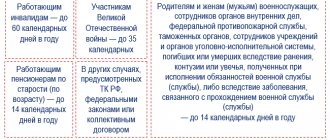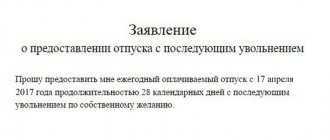Features of additional leave (DO) according to the Labor Code of the Russian Federation
The minimum duration of annual paid leave is 28 days. The duration of standard and additional leave is summed to determine the total duration of the employee's annual leave. The employer is obliged to pay for all working days included in the planned rest. Vacation pay for holidays and weekends will not be accrued in accordance with Article 120 of the Labor Code of the Russian Federation.
Annual paid leave (which includes DO) can be provided in installments throughout the year on the basis of Part 1 of Article 125 of the Labor Code of the Russian Federation. The minimum duration of such a mini-vacation is 14 days.
Duration of additional vacation days for length of service
The length of vacation days granted for long service depends on the sector of service:
- Teachers of general education institutions have the right to long leave for up to a year . That is, every 10 years of continuous activity, a teaching employee has the right to take an annual vacation period.
- Employees of medical organizations have three additional days of vacation, subject to continuous activity for 3 years.
- Police officers serving in internal affairs bodies have the legal right to receive additional days in accordance with their total length of service . So, with 5-10 years of service, the employee’s vacation is extended by 3 days, 10-15 years - by 5 days, 15-20 years - by 10 days, 20 or more years - by 15 paid days off in addition to the usual vacation.
- Civil servants, depending on their length of service, are entitled to : for years of service from 1 to 5 years - 1 day, from 5 to 10 years - 5 days, from 10 to 15 years - 7 days, from 15 years and more - 10 additional days of vacation. Russian law regulates for municipal employees the provision of an additional vacation period of no more than 10 days.
- Employees in the position of prosecutor are entitled to the following number of additional days of vacation : with 10 years of service - 5 days, 15 years - 10 days, 20 or more years - 15 days off for annual paid leave.
- Employees of the forestry industry with a continuous three-year work experience are granted additional leave of 24 working days (in the amount of annual paid leave).
In what cases is additional leave granted?
DO is provided only to certain categories of employees based on the following sources:
- Labor Code.
- Letters from Rostrud.
- Decrees of the Government of the Russian Federation.
DO can be issued both as compensation for certain working conditions, and as an incentive for long service in the organization, length of service. Let us consider in detail all cases of providing DO.
When working in harmful or dangerous conditions
The mandatory provision of supplementary care to people working in harmful or dangerous conditions is regulated by Article 117 of the Labor Code of the Russian Federation. These conditions include:
- Mining works underground.
- Open pit mining (for example, in quarries).
- Activities involving interaction with harmful chemical, biological and other elements.
The minimum duration of DO in this case will be 7 days. This duration is stipulated in paragraph 1 of Government Decree No. 870.
One of the documents on the basis of which leave is granted is the List of industries with hazardous working conditions, approved on November 25, 1974. In it, the recommended duration of pre-term training is expressed without taking into account weekends. Depending on the position, the employee may be given 6-36 days of rest.
IMPORTANT! The employer has the right to increase the duration of DO. This decision needs to be consolidated with the help of a number of internal documents: labor and collective agreements, regulations on the procedure for granting vacations.
We wrote in more detail about additional leave under hazardous working conditions in the next article.
For special work
The provision of subsidiaries to employees whose work is of a special nature is stipulated in Article 118 of the Labor Code of the Russian Federation. The list of such “special” types of activities is approved by the Government of the country. DO is issued to the following categories of employees:
- General practitioners and nurses, subject to continuous work for three years.
- Employees of the territorial power structures of the Chechen Republic or seconded to the Republic.
- Transport and communications workers with a special nature of work.
Not all categories of employees entitled to DO are listed in the Labor Code. For example, employees of bodies of the Chechen Republic are granted leave on the basis of the relevant resolution.
During irregular working hours
Irregular working hours presuppose a regime in which the employer can involve an employee in performing job functions outside the established schedule. An employee's activities beyond the established working day do not provide for payment of compensation in cash. Compensation is provided by the provision of paid subsidiaries.
More information about granting additional leave for irregular working hours can be found in a separate article.
In case of irregular working hours, an annual supplement is provided, the minimum duration of which is 3 days (specified in Article 119 of the Labor Code). The employer does not have the right to reduce the duration of the period, but may increase its duration. The maximum duration of rest was approved by paragraph 8 of the Rules “On DOs” dated April 30, 1930. According to the still valid law, vacation can last up to 14 days (calendar). The procedure for granting leave is established by Government Decree No. 884.
What should an employer consider when determining the duration of additional rest? Typically, the length of rest depends on whether the employee is often involved in overtime work. If this is a rare practice, then the vacation will be short.
IMPORTANT! An employee’s irregular working hours must be recorded in employment contracts and collective agreements. This need is stipulated in Article 57 of the Labor Code of the Russian Federation.
When working in the Far North
The minimum duration of additional training when working in the Far North is approved by Article 321 of the Labor Code of the Russian Federation:
- When working in the Far North - 24 days.
- When working in territories with conditions equivalent to the Far North - 16 days.
Also, leave, according to Article 302 of the Labor Code of the Russian Federation, is granted to persons working on a rotational basis in the Far North.
According to Article 322 of the Labor Code, two annual leaves can be combined. The total duration of such rest should not be more than six months. If, when adding both DOs, the duration exceeds 6 months, the remainder is redistributed to the next vacation. For example, when adding two DOs, the result was a duration of 7 months. One month will be added to the next additional leave.
When working part-time
The definition of part-time work is set out in Article 282 of the Labor Code of the Russian Federation. According to the Code, this is the performance of certain work in free time from main work. Such work will be part-time only if it is regular. The specifics of providing subsidiaries in this situation are stipulated in Article 286 of the Labor Code of the Russian Federation. Leave at the place of part-time work is granted simultaneously with leave at the main place of employment. If a person worked in the first place for less than six months, and therefore cannot count on vacation, then the DO is issued in advance.
In case of occupational disease
If an employee’s illness or disability was caused by an emergency at work, the employer is obliged to provide DO. It is issued so that the employee can receive full-fledged sanatorium-resort treatment. The time it takes a person to travel to the resort is added to the vacation period. DO is paid for from the Social Insurance Fund.
For medical workers
The right to additional leave is granted only after an assessment of working conditions has been carried out. This procedure is stipulated by Article 116 of the Labor Code of the Russian Federation. If conditions are determined to be harmful or dangerous upon assessment, employees may be eligible for additional rest. Let's consider the duration of preschool education for various categories of health workers:
- Doctors of psychiatric institutions providing direct care to patients – 35 days.
- Psychiatric hospital laboratory staff – 21 days.
- Doctors providing anti-tuberculosis care – 14 days.
- Employees of X-ray laboratories in anti-tuberculosis hospitals - 21 days.
- Doctors providing care to HIV-infected people – 14 days.
This list is given in Government Decree No. 482 of June 6, 2013. If an employee has several grounds for obtaining additional permission, only one is selected. For example, a person simultaneously helps HIV-infected people and works in a psychiatric institution. On the first basis, he is entitled to 14 days of leave, on the second - 35 days. Duration BEFORE will not be cumulative. The duration of the vacation will be 35 days.
For pensioners
Working pensioners can only count on unpaid DO. Its duration is 14 days. If a pensioner has a registered disability, the duration of leave increases to 60 days.
For combat veterans
Additional leave for veterans is provided on the basis of the following regulatory framework:
- Federal Law No. 5 “On Veterans”.
- Federal Law No. 76.
- Articles TC 128, 116, 125.
The state provides veterans with the following benefits:
- Possibility of receiving annual leave at any convenient time.
- Unpaid leave up to 35 days.
- Paid in advance for up to 15 days.
Combat veterans include members of the flight crew, employees of military units and those who were wounded.
For invalids
The law does not provide for a special preschool for people with disabilities. Additional days of rest are provided on a general basis. For example, if a disabled person works in difficult conditions.
IMPORTANT! The employer has the right to provide additional benefits to employees with disabilities. This benefit is fixed in collective agreements and regulations of the enterprise.
We talk in more detail about additional leave for disabled people of groups 2 and 3 in another article.
Summary
- Is additional leave for length of service provided to civilian personnel in the Ministry of Internal Affairs?
- Is it possible to divide additional leave for long service into 2 times?
- Is it possible to share additional leave for long service?
- Is a civilian employee of the Ministry of Internal Affairs entitled to additional leave for length of service?
- Is additional leave given for 20 years of service?
- I am on additional long service leave. During it I got sick.
- Long service leave
- Additional annual leave for long service
- Is maternity leave included in length of service?
- Long service leave in the Ministry of Internal Affairs
- Leave for long service in the police department
Questions
1. Is additional leave for long service granted to civilian personnel in the Ministry of Internal Affairs.
1.1. Good afternoon Order of the Ministry of Internal Affairs of the Russian Federation dated December 28, 2007 N 1236 On annual additional paid leave for employees of internal affairs bodies, organizations, divisions, institutions of the Ministry of Internal Affairs of Russia and civilian personnel of the internal troops of the Ministry of Internal Affairs of Russia" (with amendments and additions)
Order of the Ministry of Internal Affairs of the Russian Federation dated December 28, 2007 N 1236 “On annual additional paid leave for employees of internal affairs bodies, organizations, divisions, institutions of the system of the Ministry of Internal Affairs of Russia and civilian personnel of the internal troops of the Ministry of Internal Affairs of Russia” With amendments and additions from:
April 20, 2015 GUARANTOR:
This order applies to the extent that does not contradict Federal Law No. 342-FZ of November 30, 2011 “On service in the internal affairs bodies of the Russian Federation and amendments to certain legislative acts of the Russian Federation”
On additional leaves for employees of internal affairs bodies, see Article 58 of the said Federal Law
For the purpose of social protection of employees of internal affairs bodies, organizations, divisions, institutions of the Ministry of Internal Affairs of Russia and civilian personnel of the internal troops of the Ministry of Internal Affairs of Russia, on the basis of part two of Article 116 of the Labor Code of the Russian Federation * (1) - I order:
1. To provide, from January 1, 2008, to employees of internal affairs bodies, organizations, divisions, institutions of the Russian Ministry of Internal Affairs system and civilian personnel of the internal troops of the Russian Ministry of Internal Affairs* (2) annual additional paid leave for length of continuous work in the Russian Ministry of Internal Affairs system:
— from 5 to 10 years — 3 calendar days;
— from 10 to 15 years — 5 calendar days;
— from 15 to 20 years — 10 calendar days;
- over 20 years - 15 calendar days.
2. Establish that:
2.1. Annual main and additional paid leave are summed up. By agreement between the employee and the employer, annual paid leave can be divided into parts. Moreover, at least one part of this leave must be at least 14 calendar days. Information about changes:
By Order of the Ministry of Internal Affairs of Russia dated April 20, 2015 N 447, subclause 2.2 was amended
See the text of the subparagraph in the previous edition
2.2. The period of continuous work for granting employees annual additional paid leave includes the length of service that gives the right to receive a percentage bonus for continuous work in the system of the Ministry of Internal Affairs of Russia, as well as the length of service that gives the right to receive a monthly bonus for length of service to employees of certain departments of the internal affairs bodies and internal troops of the Ministry of Internal Affairs of Russia, payment for which is made in accordance with the Decree of the Government of the Russian Federation of August 5, 2008 N 583 “On the introduction of new systems of remuneration for employees of federal budgetary, autonomous and government institutions and federal state bodies, as well as civilian personnel of military units, institutions and divisions of federal executive authorities, in which the law provides for military and equivalent service, the remuneration of which is currently carried out on the basis of the Unified tariff schedule for remuneration of employees of federal government institutions"* (3).
3. Control over the implementation of this order is entrusted to the Deputy Ministers of Internal Affairs of the Russian Federation in the areas of activity supervised and the Commander-in-Chief of the Internal Troops of the Ministry of Internal Affairs of Russia.
Minister General of the Army
Registered with the Ministry of Justice of the Russian Federation on January 21, 2008.
Registration N 10959
Information about changes:
By Order of the Ministry of Internal Affairs of Russia dated April 20, 2015 N 447, changes were made to the footnotes
See footnote text in previous edition
* (1) Collection of Legislation of the Russian Federation, 2002, No. 1 (Part I), Art. 3; N 30, art. 3014, 3033; 2003, N 27 (part I), art. 2700; 2004, N 18, art. 1690; N 35, art. 3607; 2005, N 1 (part I), art. 27; N 19, art. 1752; 2006, N 27, art. 2878; N 52 (part I), art. 5498; 2007, N 1 (part I), art. 34; N 17, art. 1930; N 30, art. 3808; N 41, art. 4844; N 43, art. 5084; N 49, art. 6070.
* (2) Hereinafter referred to as “workers”.
* (3) Collection of legislation of the Russian Federation, 2008, N 33, art. 3852; N 40, art. 4544; 2010, N 52, art. 7104; 2012, N 21, art. 2652; N 40, art. 5456; 2013, N 5, art. 396; 2014, N 4, art. 373.
2. Is it possible to divide additional leave for long service into 2 times.
2.1. The law does not prohibit doing this.
3. Is it possible to share additional leave for long service?
3.1. Hello, yes it is possible, if the employer’s regulations do not provide otherwise.
4. Is a civilian employee of the Ministry of Internal Affairs entitled to additional leave for length of service?
4.1. By itself, just because he works in the Ministry of Internal Affairs - no.
5. Is additional leave given for 20 years of service?
5.1. Yes, definitely
6. I am on additional leave for long service. During it I got sick.
6.1. For military personnel who fall ill during the main or additional leave, except for leave for personal reasons, the main or additional leave is extended by the corresponding number of days of illness. Your leave is a leave for personal reasons.
7. When dismissing an employee at his own request, the employee was not paid compensation for additional days of vacation for length of service.
7.1. Hello! Cash compensation for unused additional leave is paid in full only for leave from previous years; if leave is not used in the year of dismissal, then compensation is paid in proportion to the period of service in the year of dismissal (clauses 101.3, 101.4 of Order of the Ministry of Internal Affairs of Russia dated January 31, 2013 No. 65 ).
8. I work as a music director in a kindergarten, I’m going on vacation, but I accidentally came across an article that says that in addition to annual leave, an employee has the right to additional days of vacation (for length of service), depending on the employee’s length of service (more than a year - 1 day; 5-10 years - 5 days, over 10 and up to 15 years - 7 days; over 15 years - 10 days). And if this is so, then what regulatory legal documents are needed to prove it, what law or article can I rely on to prove it to the manager?
8.1. Hello Marina, according to Art. 334 of the Labor Code, teaching staff of an educational institution are granted annual basic extended leave, the duration of which is determined by the Government of the Russian Federation. The duration of such leave is 42 and 56 calendar days. The list of teaching staff entitled to extended paid leave is determined by the standard regulations on educational institutions of the corresponding type and type. The register of positions in the federal state civil service was approved by Decree of the President of the Russian Federation of December 31, 2005 N 1574; the music director in a preschool educational institution does not belong to them. But you are a teaching worker on the basis of the Nomenclature of positions of teaching staff of organizations engaged in educational activities, positions of heads of educational organizations, approved by Decree of the Government of the Russian Federation of August 8, 2013 N 678.
8.2. The music director is not a state civil servant. Art. 46 of the Federal Law of July 27, 2004 N 79-FZ (as amended on December 11, 2019) “On the State Civil Service of the Russian Federation” (as amended and additionally, entered into force on January 1, 2019) indeed provides additional provisions. long service leave. But these holidays are provided specifically to civil servants, which you are not. Teachers have the right to leave for 1 year. According to Art. 335 of the Labor Code of the Russian Federation, teaching employees of an organization carrying out educational activities, at least every 10 years of continuous teaching work, have the right to long leave for a period of up to one year.
This is interesting: Certificate of a veteran of military service
8.3. First of all, you are not a government official. employee. It depends on what kind of kindergarten you work in. If in a regular one, then the duration of leave is 42 days, if in a specialized one, then 56 days. The duration of the annual main paid leave of music directors of kindergartens is 42 calendar days, according to clause 3 of the appendix to the Decree of the Government of the Russian Federation dated October 1, 2002 No. 724 “On the duration of the annual main extended paid leave provided to teaching staff of educational institutions of the Federation"
General educational institutions; general education boarding schools; educational institutions for orphans and children left without parental care; special (correctional) educational institutions for students and pupils with disabilities; preschool educational institutions for pupils with disabilities; health educational institutions of sanatorium type for children in need of long-term treatment; preschool educational institutions for children in need of long-term treatment; special educational institutions of open and closed type; educational institutions for children of preschool and primary school age; educational institutions for children in need of psychological, pedagogical and medical and social assistance." Federal Law of May 27, 2003 N 58-FZ (as amended on May 23, 2016) "On the public service system of the Russian Federation" Article 10. Civil servants
""1. A federal civil servant is a citizen who carries out professional work in a federal public service position and receives salary (remuneration, allowance) from the federal budget. ""2. A state civil servant of a constituent entity of the Russian Federation is a citizen who carries out professional official activities in a position in the state civil service of a constituent entity of the Russian Federation and receives a salary (remuneration) from the budget of the corresponding constituent entity of the Russian Federation. In cases provided for by federal law, a state civil servant of a constituent entity of the Russian Federation may receive salary (remuneration) also from the federal budget. ""3. The employer of a federal civil servant is the Russian Federation, and a state civil servant of a subject of the Russian Federation is the corresponding subject of the Russian Federation. ""4. The legal status (status) of a federal civil servant and a state civil servant of a constituent entity of the Russian Federation, including restrictions, obligations, rules of official conduct, responsibility, as well as the procedure for resolving conflicts of interest and service.
8.4. Good day Marina
You have the right to additional days of vacation. For example, an employee is entitled to an annual basic paid leave of 28 calendar days and an annual additional paid leave for work in hazardous conditions of 7 calendar days. So this employee can, for example, take 15 calendar days off at once, and divide the rest - 20 calendar days (28 days - 15 days + 7 days) - into 20 one-day vacations
Article 125 of the Labor Code In addition to the main annual paid leave, some employees are also entitled to additional annual paid leave (Articles 114, 116 of the Labor Code of the Russian Federation). Any employee with whom an employment contract has been concluded (Article 21, 114 of the Labor Code of the Russian Federation) has the right to annual basic paid leave. As a general rule, the duration of the annual basic paid leave is 28 calendar days (Article 115 of the Labor Code of the Russian Federation). True, there are exceptions to this rule: certain categories of workers are entitled to extended basic leave (Article 115 of the Labor Code of the Russian Federation). For example, teachers belong to this category. Thus, additional education teachers working with students with disabilities are entitled to 56 calendar days of basic leave (Article 334 of the Labor Code of the Russian Federation, Decree of the Government of the Russian Federation dated May 14, 2015 N 466). An employee can apply for annual leave for the first year of work after six months of continuous work with a specific employer (Article 122 of the Labor Code of the Russian Federation). At the same time, with the consent of the employer, the employee can go on annual leave earlier than this period.
Vacation for the second and subsequent years of work with a particular employer is granted at any time of the year in accordance with the vacation schedule. Annual additional paid holidays are provided (Article 116 of the Labor Code of the Russian Federation)
8.5. Ped. an employee in a municipal preschool educational institution is not even a municipal employee. For length of service, according to the laws you specified, it is due to civil servants, municipal - it is established by local government bodies (if established), including teachers. workers. Research into such a regulatory framework costs slightly more than the price you pay for a regular consultation. Or wait for a response from a highly specialized Irkutsk lawyer, if one is available here. Article 132 of the Constitution of the Russian Federation and Art. 17 of the Federal Law of October 6, 2003 No. 131-FZ “On the General Principles of the Organization of Local Self-Government in the Russian Federation” - laws that refer your question to the jurisdiction of the compulsory medical insurance, but do not substantiate your wishes.
8.6. — Hello dear site visitor! this law has nothing to do with you. You are not a Civil Servant!
See Federal Law No. 79-FZ dated July 27, 2004 (as amended on December 11, 2019) “On the State Civil Service of the Russian Federation.” Good luck to you and all the best, with respect, lawyer Ligostaeva A.V.
9. Is it necessary to divide additional leave for long service in proportion to the time worked when calculating the remaining days of leave upon dismissal?
9.1. No, this is not required.
10. If I have more than 25 years of service, including benefits, then after my dismissal, will I be subject to additional leave benefits for long service in a commercial structure or some federal state unitary enterprise, as well as VBD leave? Thank you!
10.1. No, such organizations are not required to give additional leave, this is not military service, but military leave is the only way it can be.
Federal Law of January 12, 1995 N 5-FZ (as amended on July 29, 2019) “On Veterans” (as amended and supplemented, entered into force on January 1, 2019) Article 16. Social support measures for combat veterans
11) use of annual leave at a time convenient for them and provision of leave without pay for a period of up to 35 calendar days per year;
11. I’m going to retire on superannuation. At the moment I am on additional leave for 2021, as well as on sick leave. I have not been on vacation in 2021. How to correctly write a report on dismissal from the Department of Internal Affairs for retirement, so as not to go back to service?
11.1. Federal Law “On Service in the Internal Affairs Bodies of the Russian Federation and Amendments to Certain Legislative Acts of the Russian Federation” dated November 30, 2011 N 342-FZ (latest edition) Article 81 establishes a period of one month between filing a report and dismissal Most likely you will have to submit a report to be granted leave with subsequent dismissal so as not to go to work.
12. I am an employee of the Ministry of Internal Affairs. Experience 25+. Received notice of job reduction on 01/29/2019. I plan to use additional leave for long service, and receive compensation for unused main leave. Questions: 1. Is the salary maintained during the period of additional leave? 2. Is it possible to receive financial assistance for recovery? 3. How is compensation for unused basic leave calculated?
12.1. Hello, Maxim! Your ability to use vacation depends on the date of reduction of the position you are filling; the fact that the notice was served on 01/29/2019 does not in itself indicate that the position will be reduced on 03/29/2019 (i.e. in 2 months). In the system of internal affairs bodies this is possible, because it is possible to place an employee at the disposal of the body in which he serves. Check the notice to see if the date of job reduction is indicated; if not, check with the HR department. After this, you can discuss your questions in more detail.
Procedure for registration of paid DO
Let's consider all the important stages of applying for additional leave:
- An order for DO is issued. It must correspond to the T-6 or T-6a form. The registration rules are set out in Resolution of the State Statistics Committee No. 1.
- Drawing up a calculation note on the basis of which vacation pay is provided. Let us remind you that the employee must receive all necessary payments three days before the start of the vacation (according to Article 136 of the Labor Code). Accordingly, the note must be prepared in advance. It is compiled on the basis of the Resolution of the State Statistics Committee in the form T-60.
- In section 8 of the employee’s personal card, you must enter information about the additional leave granted: time worked, duration of leave, start and end date. You will also need to indicate the basis for providing the DO. The details of the leave order are entered into the personal card.
- All necessary marks are placed on the working time sheet. Codes for additional leave: “OD” and “10”.
The employee must receive all required payments on time. During the registration process, it is important to correctly calculate the duration of the DO. It should be borne in mind that in modern legislation the duration of vacation is indicated in calendar days. However, sometimes when making calculations you have to rely on old-style laws, which indicate only working days without taking into account weekends.
ATTENTION! Additional permission is granted based on a written application from the employee. If the leave is not paid, the employer does not have the right to send an employee to the DO on his own initiative. Everything requires a written initiative from the employee.
What to do if an employee refuses additional permission?
The employee has the right to refuse additional leave and demand payment of compensation. The request must be made in the form of a written application. The employer can either pay compensation for unused DO in full or refuse the employee’s request.
Who is entitled to additional leave?
There are several types of positions in which employees can benefit from additional leave for length of service. These are the employees:
- Police;
- Municipal and state;
- Medical institutions;
- Educational sphere;
- Military;
- Retired but working;
- Courts and prosecutors.
An employee of the Ministry of Internal Affairs (police) has the right to extended and additional vacancies. This is enshrined in Federal Law 42, article. 56, paragraph 1. According to the legislation in force in the Russian Federation, employees of the Ministry of Internal Affairs are entitled to a mandatory vacation bonus, as well as additional days.
- Those who have worked from 5 to 10 years are entitled to receive 72 additional hours;
- Ten to fifteen – for five days;
- From fifteen to twenty – ten days;
- From twenty years and above – fifteen days.
An employee can distribute his days off as he wishes. Add to basic rest or spend in another period, with the permission of management.
Civil servants
Employees of state and municipal structures can receive extended time off, in accordance with Article 25, paragraph 4 and Federal Law No. 79.
The length of time off depends on length of service and position held and ranges from 30 to 35 days. The duration is calculated as follows - one full period of work - 12 months is equal to one vacation day.
Military personnel
Russian military personnel can receive additional leave for years of service. According to Federal Law No. 76, extended leave of up to thirty calendar days is given to military personnel with at least twenty years of service. Leave is given once at any time at the request of the employee.
Extended vacations of an employee of the Ministry of Emergency Situations are regulated by Resolution No. 285 of the Ministry of Emergency Situations of the Russian Federation. According to the document, additional time off is given according to the following scheme:
- Service for five to ten years – 72 hours;
- From ten to fifteen - five days;
- From fifteen to twenty – ten days;
- More than twenty - fifteen days.
Additional long service leave for working pensioners
At the moment, working pensioners are provided with extended time off in accordance with Article 128 of the Labor Code. A working citizen of retirement age has grounds to request an extension of rest from the employer at least once every 12 months, for a period of two weeks.
Working pensioners can receive extra pay without paying for missed days:
By age - two weeks, once every 12 months;
Veterans – thirty-five days every 12 months.
The authorities cannot refuse a citizen this request.
How to reflect vacation pay in accounting?
Payments made in connection with the subsidiary are considered expenses for ordinary forms of activity of the enterprise. They must be reflected as a debit for production expenses. Correspondence – account 70 “Settlements with personnel”.
IMPORTANT! If the total duration of an employee's annual vacation (including holidays) exceeds 28 days, payments for subsequent days will be included in the accounting loss.
When issuing vacation pay, a permanent tax liability is created. It must be reflected in debit account 99 “Profit and expenses”. Correspondence – credit account 68 “Tax payments”
Personal income tax on payments in connection with subsidiary
Personal income tax is withheld on the date of payment to the employee. This rule is set out in paragraph 4 of Article 226 of the Tax Code. According to Articles 209 and 210 of the Tax Code, vacation pay is taxable income of the employee. Personal income tax will be withheld in any case, even if additional training is provided to the employee due to harmful working conditions.
IMPORTANT! Additional leave is available to persons exposed to radiation during the Chernobyl disaster. According to the provisions of the letter from the Ministry of Finance dated July 23, 2010, it will not be subject to personal income tax.
Withholding insurance premiums
According to Part 1 of Article 7 of Federal Law No. 212, vacation pay for additional rest is subject to insurance contributions. There is only one exception - payments in connection with leave provided to people exposed to radiation as a result of the Chernobyl disaster. This is a special case, since the payments are not vacation pay, but compensation for harm to health. This form of compensation is not subject to personal income tax and insurance premiums.
Inclusion of vacation pay for subsidiary companies as part of income tax expenses
Taxpayer expenses are any accruals to employees: wages, compensation, various incentive accruals, vacation pay (according to Article 255 of the Tax Code of the Russian Federation). Expenses will be recognized as expenses for tax purposes only if they are confirmed by primary documentation. The taxable base is only payments for DO, the duration of which is established by law.
If the duration of the vacation exceeds the established deadlines, payments for the remaining days are not included in the taxable base .
The taxable base in accordance with paragraph 24 of Article 270 of the Tax Code of the Russian Federation will not be considered payments for subsidiaries provided on the basis of collective agreements and regulations of the enterprise. For example, an employee with a disability works at an enterprise. This category of employees is not provided with additional leave according to the law. However, the employer can independently establish DO for the employee. Leave will be granted based on the regulations of the enterprise. Vacation pay issued for a period of rest will not be considered taxable.
Calculation of days of additional leave for length of service
The number of calendar days of extended rest is calculated depending on several factors; the calculation system depends on the field in which the employee works. Reasons influencing the accrual of additional vacation days:
This is interesting: Responsibilities of the management company of apartment buildings
For example, medical workers receive an extension of rest depending on their position, and military personnel depending on their length of service.
Calculation of payments
Additional days of rest must be paid in the same way as the main ones according to the standard calculation system. Time off, both basic and additional, is paid by management. The calculation formula is one billing period (12 months) multiplied by average earnings.
Similar
Every officially employed citizen, regardless of the form of ownership of the enterprise, has the right to rest. For…
Among the rights that an employer is obliged to provide to any employee under the Labor Code is vacation. Wherein…
Additional benefits are available to certain groups of employees. This also includes employees who have a certain disability group.…
Today, some mothers of many children are confident that the Labor Code of the Russian Federation contains grounds in accordance with...
Almost every pregnant woman, before taking maternity leave, thinks about what to do with...
Every citizen, after 6 months of working activity, has the right to go on vacation. Legal opportunity for…
Types and nature of labor
The specification of production and types of work that give the right to additional leave has not been carried out by modern Russian legislation, and in this part, to determine the types and nature of work, one should turn to the Soviet legacy, namely, Resolution No. 298P-22 of the State Committee for Labor and the All-Union Central Council of Trade Unions of the USSR dated October 25. 1974.
This Resolution approved the hitherto applied list of industries, workshops, professions and positions with hazardous working conditions, work in which gives the right to additional leave and a shortened working day.
What types of holidays cannot be provided in advance?
Not all types of vacations can be taken off earlier than expected. The concept of “vacation in advance” most often refers specifically to annual vacation paid by the employer. But there are some types of leave that must have a documentary basis, so they cannot be granted in advance if the employee does not have an official document confirming this basis. Such holidays include:
- additional;
- administrative;
- training;
- maternity leave (both for childbirth and for caring for the baby).
Algorithm for booking vacation in advance
The procedure for applying for an unscheduled vacation is practically no different from the steps that must be taken when receiving a planned vacation. The main difference here is the mandatory application procedure. This is logical, because such leave is not in the vacation schedule; the employer does not know that the employee needs time off from work.
How to make an application
Therefore, the first step when applying for vacation in advance should be writing an application. The document does not have a specific form, so the application is written in any form. It can be written by hand, but it can also be printed on a computer, providing only an original signature. But according to personnel records, the application must contain:
- The introductory part - the “header” - of the statement. If an employee does not want to look illiterate in terms of standard document flow, it is recommended to know several immutable rules when drawing up paper:
- In the upper right part of the application it is written to whom the document is addressed. Don't forget to leave the left side for the resolution.
- The first step is the exact position of the head of the enterprise (general, executive, commercial director).
- Full (correct) company name.
- Next - the first name, patronymic (initials) and last name of the director. Please note that according to documentary etiquette, when submitting a request, it is recommended to write the manager’s initials first, and only then the surname. Of course, grammatical errors are not welcome here, therefore, if there are doubts about the correct spelling of the addressee’s full name, it is better to clarify this point.
- In the second part of the “header” you need to indicate the full details of the applicant - position, structural unit, full name (here the spelling of initials is standard, the last name comes first). It is recommended to indicate a personnel number, especially if the company has a large staff and there may be employees with the same surname.
- The title of the document is written with a capital letter; the use of capslock is undesirable. And you shouldn’t put a period after the word “statement”, it’s wrong.
- In the main content of the document you need to write down key data on the proposed vacation:
- The exact start and end dates (inclusive) of the vacation..
- Its duration in calendar days. It should be taken into account here that, according to labor legislation, holidays that fall during this period are not taken into account in the vacation period.
- The type of vacation period is basic annual paid.
- Finally, the date the document was written is indicated on the left. We recommend drawing up the document in advance (7-14 days before vacation is an acceptable period for going through all the authorities and calculating vacation pay).
- The original signature of the applicant is recorded on the right, and the decryption of the signature is indicated through a slash sign.
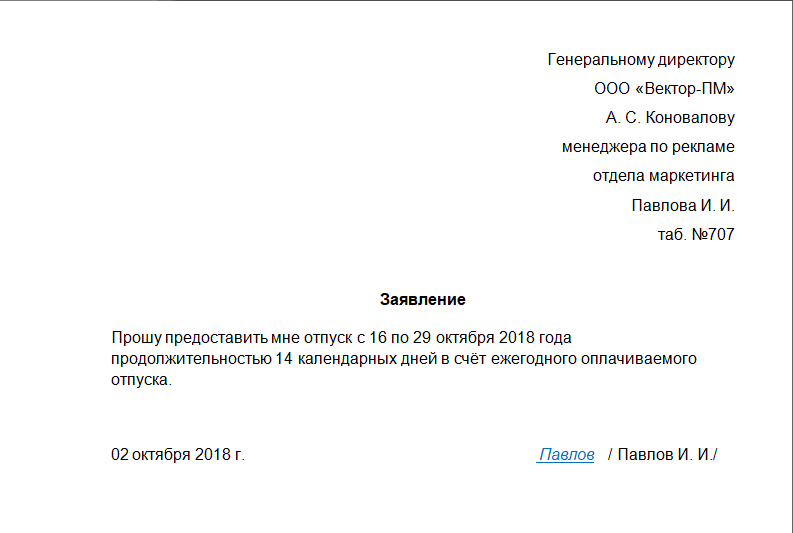
The application for advance leave can be typed or handwritten
- But the application process does not end there. To get the CEO's approval, it's a good idea to first get an "ok" from your line manager. After all, it is he who plans the work process in the department, and it is he who decides how effectively the department will cope in the absence of one staff member. Often, without such a resolution, the general will not even consider the document.
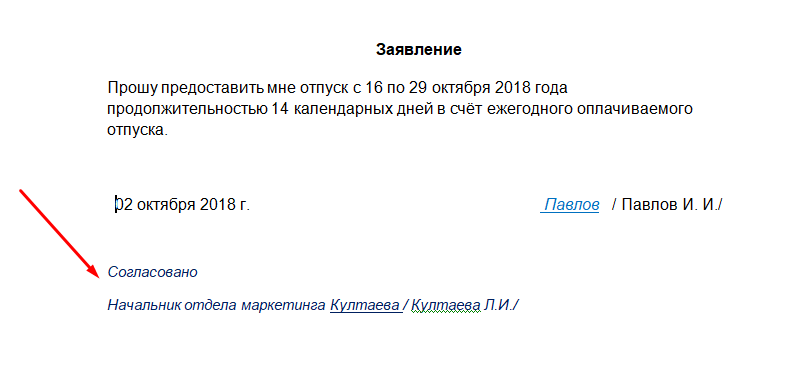
Immediate supervisor visa is an important attribute of an advance vacation application
- Note that some enterprises have a rule that the HR employee must also put his mark on such a document. As a rule, the fact is recorded here how many days of vacation the person has already worked, that the person belongs to a category of employees with preferential treatment in terms of vacations, or that the vacation is paid in advance.
- The final resolution on the statement rests with the CEO. Let us remind you that management has the right to refuse advance leave to an employee without giving reasons. But a more loyal option in case of refusal is to personally explain to the employee the reasons for such a decision.
What to consider when issuing an order to grant leave in advance
After the HR department receives an application signed by all interested parties, the HR officer dealing with leave issues starts issuing an order to grant leave to the employee. When preparing this document, you need to take into account several standards and features:
- The vacation order is drawn up according to template No. T-6 (form according to OKUD 0301005).
- In the header of the order you must indicate the full name of the organization, as well as the unique code of the company according to the All-Russian Classifier of Enterprises and Organizations (OKPO).
- An important point to consider when drawing up a vacation order is the date of issue of the document. Labor law obliges the employer to pay vacation pay at least 3 days before the start of the period. Therefore, the dated order must be the latest or earlier date.
- For advance leave, it is especially important to correctly record the period of work in the order. The working year begins from the date of employment. It is on this date that the advance or worked leave agreed to by the employee is determined.
- If during this period another type is added to the main leave, for example, an additional unpaid one. agreement, it must be reflected as well.
- The final stage when issuing an order is its approval by the head of the organization.
- Familiarizing the employee that his vacation is regulated by a separate order does not cancel the application procedure for leave. Therefore, the order must bear the signature of the vacationer and the date when he saw and read the document.
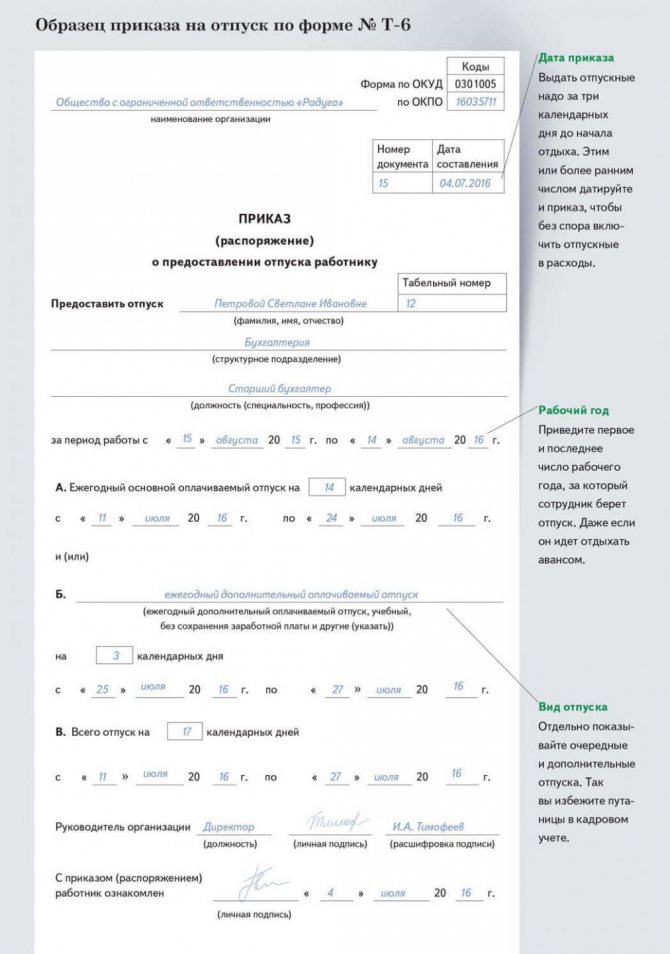
Vacation order in advance in form No. T-6
Features of calculating vacation pay, examples and subtleties
When a vacation has been agreed upon for an employee and an order ratifying an unscheduled vacation has been issued, labor law establishes a strict framework for the payment of vacation compensation - 3 calendar days before the vacation. When a weekend or holiday falls during this period, the payment must be made on the working day before. The same algorithm also works for payments for vacation provided in advance; there are no exceptions here (of course, if a paid period is taken). The fact that the vacation period has not yet been worked out does not matter; the vacationer must receive payments in full for the entire vacation period and within the period established by law.
The basis for calculation is the employee’s average daily earnings - this is regulated by Article 139 of the Labor Code of the Russian Federation. For the billing period you need to take:
- 12 months preceding the month when the employee goes on vacation;
- if this period has not yet been completed by the employee, the first (even if incomplete) month of work and all subsequent full months are taken (with the exception, again, of the month of going on vacation).
To start the calculation, you need to take all payments received from the employer for work - wages, bonuses, additional payments for work. The exception here is payments, which are calculated on the basis of the same average earnings:
- amounts received on sick leave;
- travel allowances;
- previously received vacation pay;
- subsidies for food, fuel, communications, etc.;
- days when the enterprise was idle, there was a strike, etc.
As a result, to calculate average earnings, you need to use the formulas:
- Definition of average daily earnings - the entire amount of payments included in the calculation is divided by the product of the full months worked by the person and the coefficient 29.3 - the average number of days in a month (determined by the Government of the Russian Federation). If a person has incompletely worked months, then the number of calendar days in the month in which there were uncountable periods must be added to this product.
- For example, employee Ivanov I.I., was employed by the company on May 29, 2021 and, after working for 4 full months, wrote an application and received management’s consent to leave from October 22, 2018. Accordingly, with a constant salary of 30,000 rubles per month and earnings received for 3 days of May 2021 (3,913 ₽), the calculation of average earnings will look like this:
- Earnings for the period - 30,000 ₽ x 4 months + 3,913 ₽ = 123,913 ₽.
- Average daily earnings - 123,913 ₽ / (4 months x 29.3 + 3 days of May) = 1,030.89 ₽ (SDZ).
- Calculation of vacation pay - when the figure of the employee’s estimated average daily earnings is multiplied by the number of calendar days of approved vacation.
- Let's say Ivanov I.I. was agreed to leave for 14 days.
- Accordingly, you need to take Ivanov’s SDZ for the billing period and multiply this indicator by the number of vacation days.
- 1,030.89 ₽ x 14 days = 14,432.47 ₽.
- To pay compensation, personal income tax must be deducted from the amount received (depending on the employee’s residence, if the Russian Federation, then 13%) - 14,432.47 ₽ - (14,432.47 ₽ x 13% = 1,876.22 ₽) = 12,556, 25 ₽ (must be issued in person or by Ivanov I.I.’s bank card).
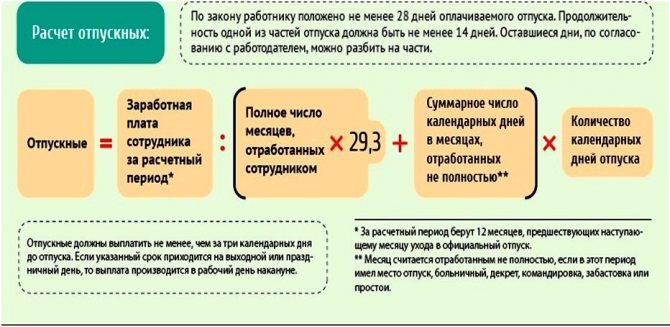
The formula for calculating vacation pay is not as complicated as it seems at first glance
How to reflect the rest period in advance in the vacation schedule
Let's take the first option - when a new employee goes on vacation, who is not in the approved vacation register. There can be 2 ways here:
- Please note that according to labor law, the employer in this case is not obliged to make adjustments to the vacation schedule. That is, control over the vacation periods of newcomers can be carried out using the chain: application → agreement with management → order → calculation note → personal card. Accordingly, you do not have to enter this data into the register.
- But if the personnel officer, rightly believing that it is impossible to keep everything in his head, and it would be more effective for document management to include the vacation periods taken by new employees in the vacation schedule, an additional schedule-application is prepared. It is filled out according to the template accepted by the company (there is no mandatory form, but most employers use the T-7 form).
If an unscheduled vacation is taken by an employee who has been working in the company for more than a year, and, therefore, is included in the vacation schedule, a note about the transfer of the period must be included in the document.
If the enterprise uses the T-7 format, it contains blocks numbered 8 and 9 specifically for such periods, where the basis for the transfer is written (in our case, an application). In addition to the vacation application, an order must also be reflected in the schedule, since it is this document that gives the employee the right not to attend work during this period.
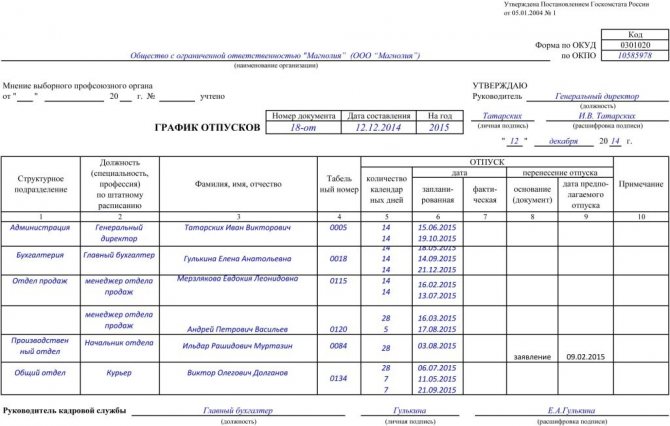
The transfer of vacation is recorded in the vacation schedule in columns 8 and 9
